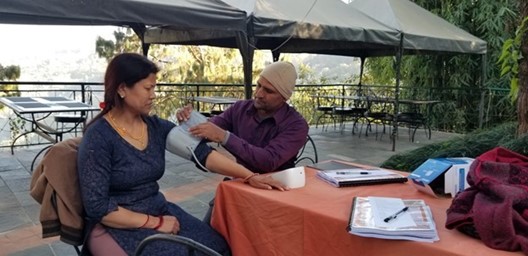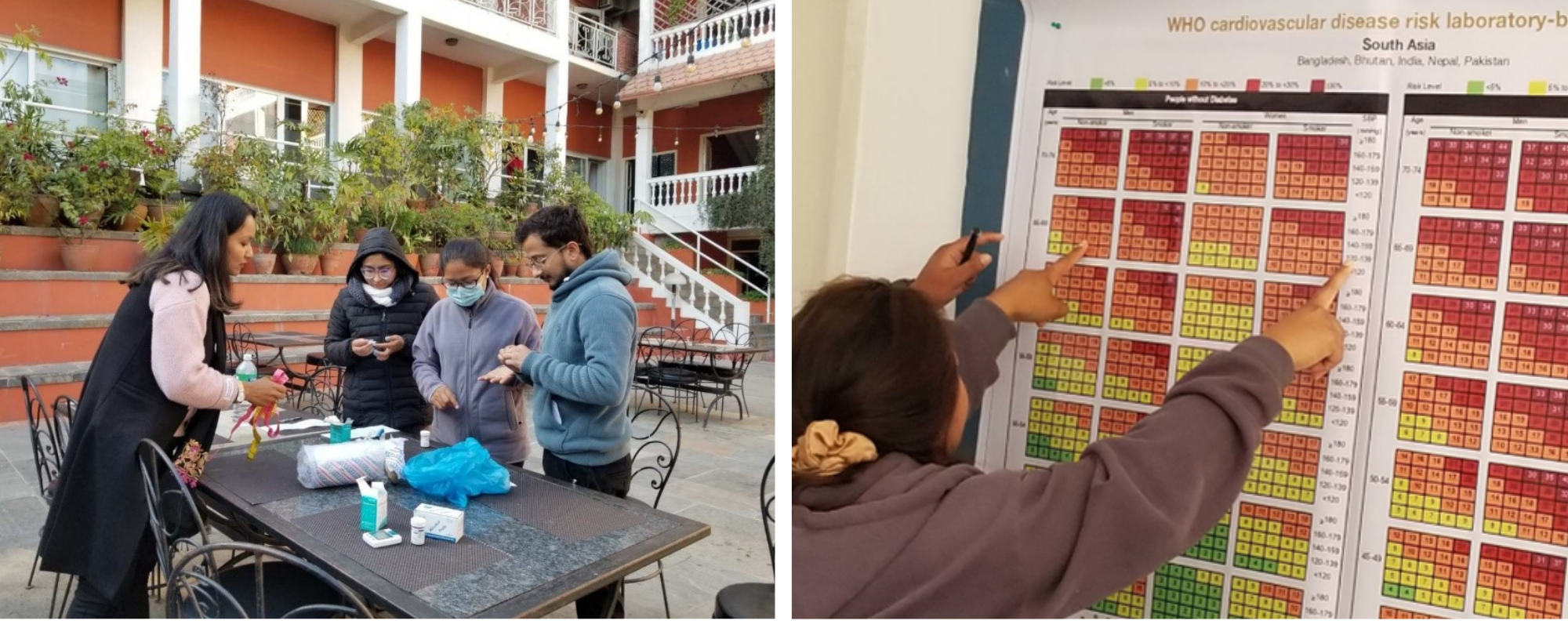Dhulikhel, Bagmati Province
More than 70% of deaths in Nepal are attributed to noncommunicable diseases (NCDs). The burden of NCDs among the younger age group (18-30 years) is also witnessing a continuous rise.
Noting the escalating burden of NCDs in the country, the Ministry of Health and Population (MoHP) has implemented a program aimed at strengthening NCD service delivery through capacity building of health workers, including Auxiliary Health Workers, health assistants, community and staff nurses, family physicians, and medical doctors.

Practical sessions during the workshop to train healthcare workers on stronger management and delivery of noncommunicable diseases in Nepal. Photo credit: WHO Nepal
The programme, one of the initiatives supported by the WHO-NORAD Project, has trained over 250 health workers from six districts: Ilam, Kavrepalanchowk, Manang, Lumbini, Kailali, and Kavre. During the trainings held in 6 batches, between 30 November – 14 December, health workers were taught about delivery of basic NCD services, such as blood pressure and sugar screening, identifying risks for cardiovascular diseases, proper recording and reporting methods and tools, techniques to quit alcohol and smoking, and advocacy on healthy lifestyles.
The NORAD-WHO Project aims to improve the delivery of essential NCD services through the use of Nepal Integrated NCD Care Model (NINCM) and will build on the existing initiatives of Package of Essential Noncommunicable (PEN) and mental health interventions to develop a comprehensive service delivery including early detection, management, and long-term care for common NCDs.
Overall, this training is expected to strengthen the government's interventions including its introduction of the PEN to provide screening, diagnosis, treatment, and referral services for NCDs and mental health issues at health posts, primary health care centers, and district hospitals for early detection and management of chronic diseases within the community.

Participants at the workshop to train healthcare workers on stronger management and delivery of noncommunicable diseases in Nepal. Photo credit: WHO Nepal
Preceding the training, a one-day interaction program for health managers was also conducted in the six WHO-NORAD project implementing districts to orient them on NCDs service delivery.
PEN is also regarded as a WHO-proven intervention package on NCDs to achieve a reduction in premature mortality from NCDs by 25%. In Nepal, the PEN Implementation Plan (2016–2020) was developed in line with the Multisectoral Action Plan for the prevention and control of NCDs (2014-2020).
The capacity building of healthcare workers on the management of NCDs will help integrate NCD services into the primary health care (PHC) system in Nepal. The model, developed by WHO, reinforces a PHC-oriented care delivery as a foundational approach comprising of screening, early detection, and management.

Dr Rais Pokharel, NORAD Project Coordinator, facilitating the workshop to train healthcare workers on stronger management and delivery of noncommunicable diseases in Bagmati Province, Nepal. Photo credit: WHO Nepal
“The program will improve the care coordination pathways, from the reminders recall of follow ups, team coordination at the health facility with refills of the prescription, to coordinated referrals to higher centers," said Dr. Chuman Lal Das, Director of Epidemiology and Disease Control Division (EDCD), MoHP. “The support from all tiers of the government to make this training possible is also commendable. We could easily identify healthcare workers in the palikas due to a seamless cooperation and coordination among government and implementing partners.”

Practical session held during the workshop. Photo credit: WHO Nepal
WHO played a key role in actively monitoring all the training processes, provided technical support in conducting the program, and supporting the administrative and financing process.
“From training to adoption of practices in health facilities, this is an important and innovative method to sustainably increase skilled manpower to respond to NCDs and also minimize turnover of healthcare workers,” said Dr Rajesh Sambhajirao Pandav, WHO Representative to Nepal. “This strengthening of NCDs and mental health services at the primary health care level will not only save lives from NCDs, but also bring us closer to realizing the goal of universal health coverage.”
WHO will now support the MoHP to train more healthcare workers in all provinces of Nepal.
